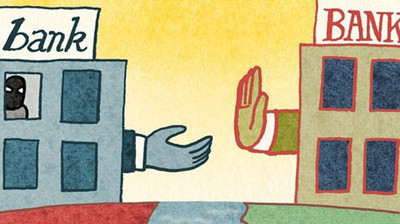金錢的罪惡
Hitting at terrorists, hurting businesses
打擊恐怖,損害金融。
Forcing banks to police the financial system is causing nasty side effects
迫使銀行監督金融機構會造成令人厭惡的副作用。
KIDNAPPINGS for ransom, drug-smuggling, fake invoicing and extortion are just a few of the ways in which terrorists raise cash for their nefarious deeds. Some scams take advantage of globalisation: American officials found that Hizbullah, a Lebanese movement, raised funds by exporting used cars from America and selling them in west Africa.
綁架勒索贖金,毒品走私,假發票和敲詐勒索只是恐怖分子籌集現金途徑的冰山一角,全球化為恐怖分子資金募集提供了便利,美國官員發現一個黎巴嫩真主黨運動,依靠向西非出口來自美國的二手車籌集資金。

Governments are understandably keen to cut terrorists off from sources of cash, and have been taking drastic steps to punish banks for involvement in financing dangerous people. In 2012 the American authorities imposed a $1.9 billion fine on HSBC, a British bank, for lax controls on money-laundering. Big fines have been meted out to Barclays, ING and Standard Chartered for money-laundering or sanctions-busting. BNP Paribas of France is said to be facing a fine of as much as $10 billion in America. Such stiff penalties are popular, and provide great press for ambitious prosecutors. Cut the flow of money to terrorism, their thinking goes, and it will wither.
政府希望減少恐怖分子從資金來源,并已采取行動來懲罰同恐怖活動有金融活動來往的銀行。2012美國當局向英國匯豐銀行罰款19億美元,原因是未能有效防控恐怖組織洗錢。巴克萊銀行,荷蘭國際集團和渣打銀行已經由于涉嫌幫助恐怖組織洗錢或違反制裁而受到巨額罰款。法國巴黎銀行表示,將面臨來自美國10億美元的罰款。嚴厲的懲罰成為涉恐案件檢察官常用的手段,他們認為這樣可以削減資金流向恐怖主義,這種方法是否有效還有待商榷。
Yet there are two problems with this approach. First, the regulations are so demanding and the fines so large that banks are walking away from countries and businesses where they perceive even the faintest whiff of risk. American regulators, for instance, require banks to know not only who their customers are, and what they plan to do with their cash, but also the identities and intentions of their customers' customers. Correspondent-banking relationships—the arteries of global finance that allow people and firms to send money from one country to another, even if their own bank does not have a branch there—are therefore collapsing. Some of world's biggest banks privately say they are cutting as many as a third of these relationships.
然而,這種方法有兩個問題。第一,政策非常苛刻,罰款數額巨大,大銀行很可能會規避可能涉及恐怖犯罪的國家和商業領域。舉個例子,美國監管機構要求銀行不僅了解他們的顧客、顧客投資的方向,而且他們客戶的客戶的身份信息和投資意圖也需要了解。銀行交易代理是國際金融的動脈,他們讓資金在全球公司之間流動,即使他們自己的銀行沒有設計恐怖注意,卻也有有因此而破產的。世界最大的一些銀行私下里說他們切斷這一部分業務的1/3。
This retreat will have little impact on the rich world. Britain's Lloyds Banking Group, say, will probably always transact with Wells Fargo in America or ICBC in China. But it could prove devastating to small, poor countries whose banks lose their big international partners just because the costs of checking up on them outweigh the paltry profits they generate. Some countries risk being cut off from the financial system altogether: British banks last year threatened to close the last pipeline for money transfers into Somalia. Others will see the costs of intermediation rise: bankers talk of a tenfold increase in fees paid to send money to countries such as Tanzania. Cotton farmers in Mali and small exporters in Indonesia will find it increasingly hard to get trade finance. Even well-known charities responding to UN calls for assistance in countries such as Syria are struggling to get banks to let them send aid.
金融行業業務的縮減比如對發達國家的影響不大。英國的勞埃德銀行集團可能會一直進行同美國威爾斯Fargo或中國中國工商銀行的合作,但對貧窮小國家產生毀滅性打擊,貧困國家的銀行失去國際合作伙伴只是因為對這些國家涉恐審核的成本大于他們微薄的經濟活動利潤。一些國家為了繼續國際貿易,冒著同全球金融脫離的風險:英國銀行去年威脅要關閉到索馬里的資金渠道。另外應該注意的是經濟活動中間成本的增加:同坦桑尼亞這樣的國家進行經濟活動的成本增加了十倍。印度尼西亞的小商品出口商和馬里種棉花的農民會發現越來越難獲得貿易融資。甚至著名的慈善機構也在聯合國尋求銀行對敘利亞的援助。
Making it harder to follow the money
資金去處難以跟蹤
Were all of this actually preventing terrorism it might be judged a fair trade-off. Yet—and this is the second problem with this approach—it seems likely to be ineffective or even counter-productive. Terrorism is not particularly expensive, and the money needed to finance it can travel by informal routes. In 2012 guards on the border between Nigeria and Niger arrested a man linked to Boko Haram, a Nigerian terror group, with 35,000 in his underpants: laughable, except that the group has killed around 1,500 people this year alone. Restrictions on banks will encourage terrorists to avoid the banking system. That may hinder rather than help the fight against terrorism. A former spy complains that it has become harder to piece together intelligence on terrorist networks now that the money flows within them are entirely illicit.
所有的措施都是希望公平的權衡各國的涉恐情況然而,這是這種方法似乎很可能是無效甚至適得其反。而涉恐懲罰的第二個問題是,恐怖主義并非成本高昂,和資金可以通過非正式的方式涉及恐怖主義。2012年,警衛在尼日利亞和尼日爾之間的邊境逮捕了一名與尼日利亞的恐怖集團博科圣地有關系的恐怖分子,35000英鎊可笑的藏在他的內褲,希望該恐怖集團一年內造成約1500人死亡。懲罰涉恐銀行的措施可能使得恐怖主義繞開銀行系統,這可能會阻礙而不是幫助打擊恐怖主義。一位曾經做過間諜的抱怨說,現在更加難以拼湊出恐怖分子完整的行動計劃,網絡空間上他們的資金難以追蹤。
When the G20 meets later this year it should urge its members to accept the risk that even in well-regulated banking systems money may find its way to terrorists. Banks should be given clear guidance on necessary safeguards, but not held responsible for every breach.
在今年召開的20國集團峰會應向其成員傳達這樣的信息,即使在良好銀行監管下的資金也可能會流入恐怖主義的腰包。銀行應給予資金流動必要的保障措施和明確的指導,但不能對每種渠道負責。












